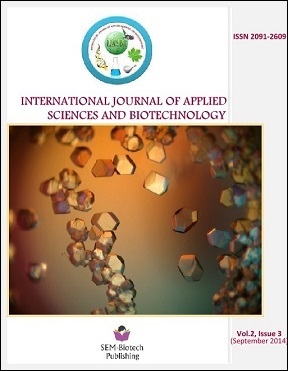Pig Sero-Survey and Farm Level Risk Factor Assessment for Japanese Encephalitis in Nepal
DOI:
https://doi.org/10.3126/ijasbt.v2i3.10639Keywords:
Japanese encephalitis, Japanese encephalitis virus, Pig, Risk factorAbstract
The objectives of this cross-sectional study was to determine the seropositivity status of Japanese encephalitis virus (JEV) in pig and ascertain the farm level risk factors in Nepal. Serum samples were collected from 181 pigs in 91 farms of Rupandehi and Kapilbastu districts and tested for antibodies by IgG ELISA. Survey of farmers in each farm was carried out to determine the farm level risk factors. A total of 20 out of 181 (11%) serum samples tested positive for JEV antibodies. There was no statistically significant difference in seropositivity with age (p>0.05), sex (p>0.05) and breed (p>0.05) of pigs. Farm level infection was significantly associated with closeness to rice fields (p<0.05), closeness to standing water sources (p<0.05), wild bird exposure (p<0.05) and mosquito bite to pigs (p<0.05). These factors need to be addressed while formulating prevention, control and management strategies of JEV in pig and hence in human.
DOI: http://dx.doi.org/10.3126/ijasbt.v2i3.10639
Int J Appl Sci Biotechnol, Vol. 2(3): 311-314




